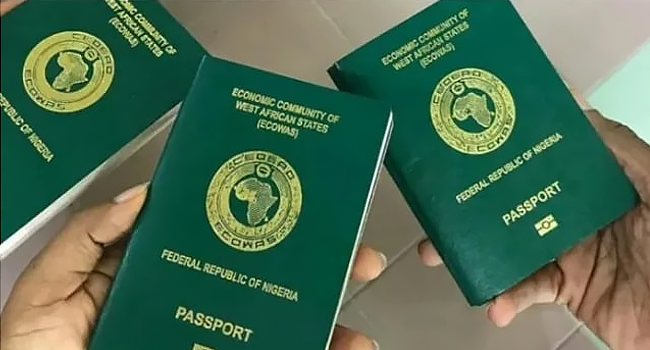THE Federal Government has defended the recent upward review of passport fees to N100,000 and N200,000, insisting that the move is necessary to guarantee faster delivery, eliminate corruption, and protect the integrity of Nigeria’s travel documents.
The Nigeria Immigration Service (NIS), in a statement signed by its Public Relations Officer, ACI AS Akinlabi, on Thursday announced that from September 1, 2025, new passport application fees in Nigeria will be N100,000 for the 32-page, five-year validity booklet and N200,000 for the 64-page, 10-year validity booklet.
According to the NIS, the adjustment only affects applications made within Nigeria. Nigerians in the diaspora will continue to pay $150 for the 32-page, five-year document and $230 for the 64-page, 10-year booklet.
“The review… is aimed at sustaining the quality of the document, making issuance processes more efficient, and maintaining the integrity of the Nigerian passport,” the statement read.
The new hike comes barely a year after the Federal Government raised passport fees in August 2024, when the 32-page booklet increased from N35,000 to N50,000 and the 64-page booklet rose from N70,000 to N100,000.
At the time, the NIS had argued that the upward review was necessary to sustain production costs and improve service delivery.
Speaking in Abuja during the Interior Ministry’s mid-tenure performance retreat, the Minister of Interior, Dr. Olubunmi Tunji-Ojo, justified the new charges, saying the reforms would guarantee that every Nigerian receives a passport within one week of enrolment.
“Our target is very clear: within one week of enrolment, every Nigerian should have their passport in hand. Not just delivering quickly, but delivering quality passports that reflect our integrity as a nation,” he declared.
Tunji-Ojo noted that before the reforms, applicants sometimes waited up to seven months or were forced to pay unofficial fees of N200,000 or more to fast-track processing.
He shared a personal experience, recalling how even as a lawmaker he had to pay heavily to secure a passport for his daughter.
“My own daughter had that bad experience. Even when I was chairman of the House Committee on NDDC, my daughter wanted passport, it was a problem. I had to pay hundreds of thousands to get a passport for my 12-year-old girl. That era is over.”
The minister highlighted the establishment of a centralised personalisation centre, described as the largest in Africa, which he said would revolutionise passport processing.
“With this facility, we can print five times more passports than we currently need. Once you enrol, it doesn’t take us more than 24 hours to vet. Printing capacity is no longer our problem,” he said.
As part of anti-corruption reforms, Passport Control Officers (PCOs) will no longer hold the power to approve or delay applications.
“Some PCOs had so much power that they could decide not to approve or print a passport until they were settled. That abuse of power ends now. Passport approval will no longer rest with PCOs,” Tunji-Ojo stressed.
He explained that centralising approvals would curb human interference, minimise extortion, and restore credibility to Nigeria’s passport system.
Beyond efficiency, Tunji-Ojo emphasised that the reforms aim to protect the integrity of Nigeria’s passport.
“My responsibility is not just to make passports available, but to ensure that anybody carrying it is a Nigerian. If you are not a Nigerian, you cannot carry it. It’s about our national integrity.”
The minister cited past abuses where foreigners obtained Nigerian passports fraudulently.
“In one incident, a Ugandan woman carrying a Nigerian passport was arrested at Lagos Airport after paying $1,000 to procure it. That cannot continue. Our passport must remain a true symbol of Nigerian identity.”
While the government insists the hike is necessary to sustain reforms, the sharp increase is likely to generate mixed reactions among Nigerians, many of whom have already raised concerns about the cost of essential documents in the face of rising living expenses.
For now, the Federal Government maintains that the reforms will end delays, cut corruption, and restore dignity to Nigeria’s travel documents.







